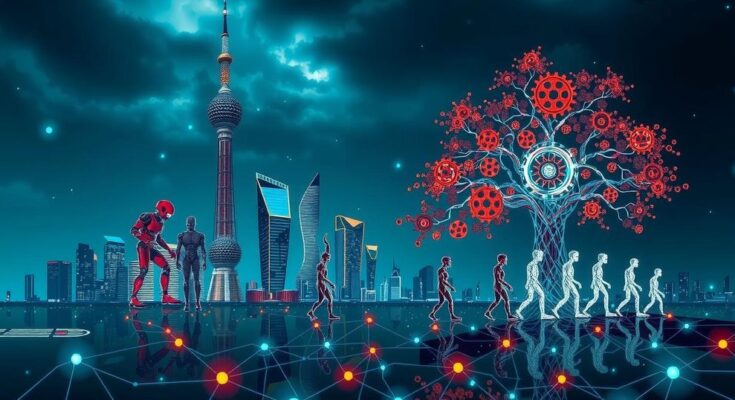The article examines the historical and potential future impacts of AI on society and human evolution, emphasizing labor power and worker autonomy. It highlights that past technological revolutions have altered societal structures and prompts a dialogue about equitable distribution of technological gains. A call to strengthen unions and encourage worker participation in decisions surrounding AI is paramount for a balanced future.
Technological advancements are reshaping society and even human physiology. As AI technology evolves, there lies a crucial socialist strategy: enhancing labor power. Throughout history, technological innovations have dramatically transformed human existence, culminating in smaller human brains today compared to our ancestors. This change is linked to the rise of language and culture, which lessened the cognitive demands on individuals. The progress from simple tools, like pointy sticks, to agriculture illustrates this transformation. Tools fostered a cultural shift towards egalitarianism among early humans. The Neolithic Revolution introduced agriculture and hierarchical structures, marking society’s evolution into complex systems with established power dynamics. Capitalism accelerated technological progress, leading to consistent revolutions in production methods. However, despite significant advancements, the anticipated productivity surge from digital technologies remains elusive. As AI emerges, fears of job loss and wealth concentration are at the forefront, prompting concerns about the future of the labor market. Historical trends suggest automation typically leads to job shifts rather than losses. Major innovations often increase managerial control over labor rather than democratize it. We face profound changes not just in work dynamics but across human existence, as AI could redefine our very nature. As AI technology unfurls, it brings real risks—like new warfare methods and enhanced surveillance—alongside potential benefits. Socialists must grapple with the rapid evolution of technology, as resisting automation may be futile. Instead, advocating for worker security and equitable distribution of resources becomes paramount. Effective conversations surrounding AI’s role require input from workers, ensuring diverse needs are acknowledged. Previous collective action revealed how elite interests often overshadow ordinary voices. Building stronger democratic unions is essential for workers to influence the deployment of AI technologies. Ultimately, historic lessons remind us that progress can benefit few while alienating many. To create a desirable future, society must prioritize broad participation in technological discourse. Let us hope that unlike the ancient revolutions, human intellect remains unshackled, allowing our brains to thrive amidst technological growth.
The article discusses the transformative impact of AI and technology on human evolution, societal structures, and labor dynamics. It reflects on historical technological advancements, highlighting the tension between progress and social inequality. The text emphasizes the importance of worker autonomy, power, and participation in shaping the future of AI governance, urging the need for stronger unions and labor advocacy amidst rapid change.
In conclusion, as AI reshapes our world, it is crucial to balance technological advancement with equitable labor practices. Historical patterns show that while innovation can lead to job displacement, it can also create new opportunities if managed wisely. Strong labor movements are essential for ensuring that the benefits of AI and technology are equitably distributed, securing a future where human intellect thrives alongside these advancements.
Original Source: jacobin.com


